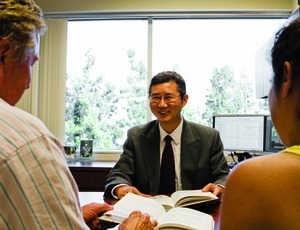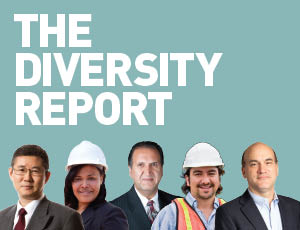Endi Zhai is a cheerful, charismatic geotechnical engineer who can charm people into doing what he asks. For example, he persuaded top-level transportation officials, mayors, city councils, and some 200 engineers and contractors from several countries to attend the International Chinese Transportation Professionals Association conference, which was held in Los Angeles in May.


Zhai, vice president for transportation technology in the Irvine, Calif., office of Kleinfelder West Inc., and his ICTPA board members recently transformed the 20-year-old regional social networking organization into a technical association that conducts conferences throughout North American and Asia that examine local and global engineering issues.
Amid China's rapid growth as one of the largest construction markets in the world, Chinese-Americans find themselves in a unique position to act as a bridge between the country and that other giant, the U.S. “We need to focus on the global construction market as a big picture,” says Zhai. “There are more and more opportunities for Chinese-American engineers to move up to management positions as firms move their business focus from regional to global construction markets.”
Such opportunities could open more of China's doors to U.S. engineering and construction companies. At the May conference, Man-Chung Tang, chairman of T.Y. Lin International, noted China's plans to invest $712 billion in transportation construction, including 10,000 kilometers of high-speed rail and 35 airports in five years.
He focused on the city of Chongqing, calling it the world's fastest-growing city. It plans to relocate half its 32 million residents to new urban residential areas, including a planned 1,200-sq-km city. Plans call for a new airport, which would be the world's third largest, 120 km of transit rail and 882 km of expressways, he said.
But city planners need global expertise to balance such vast amounts of construction with sustainability. “China would consume 135% of total global resources if it were like the United States,” he said. “We need to create a new kind of city. Chongqing is the place to do it.” He exhorted the largely U.S.-based engineering audience, saying, “Come to Chongqing!”
But doing business in China has pitfalls, even with a Chinese-American liaison. For example, in 2010, the chief executive officer of a small U.S.-based bridge technology firm met with a Chinese CEO in Beijing to sign a $1-million supply-and-support contract. The contract terms, including full credit protection, had been negotiated over prior months with the help of a U.S.-based Chinese national who knew both firms, says the American CEO, who asked to remain anonymous.
Meetings with Key Contacts
The Chinese firm took him to meetings with key government and bridge construction contacts across China. At the end of the 10-day visit, a formal contract signing ceremony was held in Beijing.
After starting production in the U.S., however, the Chinese firm said the contract was no longer valid, claiming its U.S.-based venture capital firm rejected the contract terms. “Considering the differences in culture and distance, no viable options were available, especially costly legal remedies,” says the American CEO.


Post a comment to this article
Report Abusive Comment